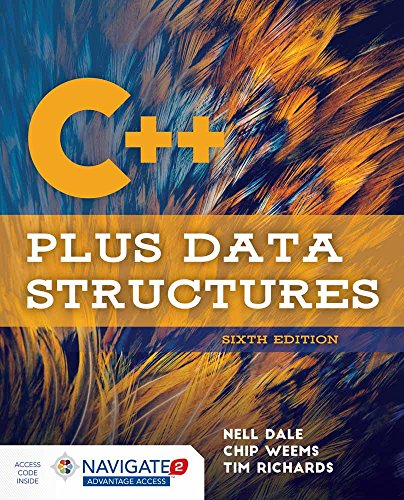

Most ebook files are in PDF format, so you can easily read them using various software such as Foxit Reader or directly on the Google Chrome browser.
Some ebook files are released by publishers in other formats such as .awz, .mobi, .epub, .fb2, etc. You may need to install specific software to read these formats on mobile/PC, such as Calibre.
Please read the tutorial at this link: https://ebookbell.com/faq
We offer FREE conversion to the popular formats you request; however, this may take some time. Therefore, right after payment, please email us, and we will try to provide the service as quickly as possible.
For some exceptional file formats or broken links (if any), please refrain from opening any disputes. Instead, email us first, and we will try to assist within a maximum of 6 hours.
EbookBell Team

0.0
0 reviewsC++ Plus Data Structures, Sixth Edition explores the specifications, applications, and implementations of abstract data types with unmatched accessibility. Topics such as modularization, data encapsulation, information hiding, object-oriented decomposition, algorithm analysis, life-cycle software verification models, and data abstraction are carefully presented to foster solid software engineering techniques.
NEW & KEY FEATURES OF THE SIXTH EDITION:
• UPDATED – Updated with new C++ 11 features including range-based for loops and threads
• NEW – Includes a new Chapter 10, Trees Plus, that emphasizes balancing of search trees by covering AVL Trees, Red-Black Trees, and B-Trees
• NEW – Includes a new chapter on Sets, Maps, and Hashing
• NEW – Chapter 12, Sorting, now includes practical performance issues and parallel merge sort
• NEW – Chapters in the second half of the text are now easier to assign in alternate orders, supporting a wider range of course goals and organizations
• NEW – Modern new design enhances the look and feel of the text
• STUDENT FAVORITE – Pedagogical features include: chapter openers with goals, marginal definition boxes, algorithm boxes, C++ boxes, function boxes, case studies, chapter summary, and end of chapter exercises
About the Author
Nell Dale received a B.S. in Mathematics and Psychology from the University of Houston, a M.A. in Mathematics, from the University of Texas at Austin, and a Ph.D. in Computer Sciences from the University of Texas at Austin. Nell Dale has been on the faculty at the University of Texas, Austin since 1975.
CONTENT DOES NOT CONTAIN NAVIGATE 2 ADVANTAGE ACCESS CODE